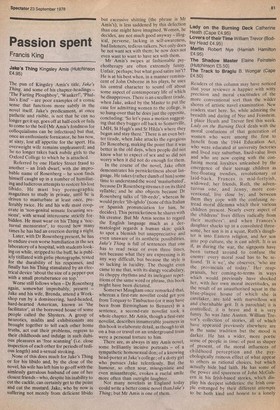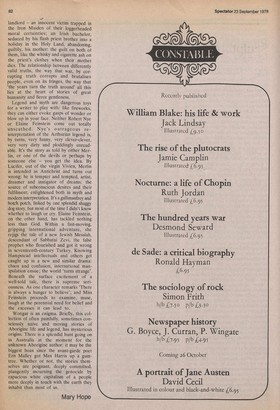Passion spent
Francis King
Jake's Thing Kingsley Amis (Hutchinson £4.95) The pun of Kingsley Amis's title, Jake's Thing, and some of his chapter-headings — 'The Farting Ploughboy', Wankerr, 'Phallus's End' — are poor examples of a comic sense that functions more subtly in the novel itself. Jake's predicament, at once pathetic and risible, is not that he can no longer get it up, goes off at half-cock or fails to come to the boil (Mr Amis's fondness for colloquialisms can be infectious) but that, once an enthusiastic fornicator, he has now, at sixty, lost all appetite for the sport. His overweight wife remains unpleasured; and he no longer takes back nubile girls to the Oxford College to which he is attached.
Referred by one Harley Street fraud to another — an Irish dwarf, with the improbable name of Rosenberg — he soon finds himself caught up in a number of humiliating and ludicrous attempts to restore his lost libido. He must buy pornographic magazines to study in private, until he is driven to masturbate at least once, preferably twice. He and his wife must cooperate in 'non-genital sensate focussing sessions', with sexual intercourse strictly forbidden. He must wear on his Thing a 'nocturnal mensurator', to record how many times he has had an erection during a night.
Later, with Dr Rosenberg present, he has to endure even worse humiliation in the sex laboratory of a hospital, with students looking on while, stripped to the buff, he is publicly titillated with girlie photographs, tested for the durability of his responses, and finally has his Thing stimulated by an electrical device 'about the size of a pepper-pot with a small protuberance on top.'
Worse still follows when —Dr Rosenberg again, somewhat improbably, present — Jake and his wife, Brenda, attend a Workshop run by a domineering, hard-headed, hard-hearted American, known as 'the facilitator', at the borrowed house of some people called the Shysters. A group of neurotics, misfits and exhibitionists are brought together to tell each other home truths, act out their problems, regress to their childhoods and indulge in such dubious pleasures as 'free scanning' (i.e. close inspection of each other for periods of tedious length) and a-sexual stroking.
None of this does much for Jake's Thing or for his libido and, by the close of the novel, his wife has left him to go off with the aimlessly garrulous husband of one of her closest friends—who, despite his inability to cut the cackle, can certainly get to the point and cut the mustard. Jake, who by now is suffering not merely from deficient libido but excessive shitting (the phrase is Mr Amis's), is less saddened by this defection than one might have imagined. Women, he decides, are not much good anyway — perverse, lacking in self-awareness, bad listeners, tedious talkers. Not only does he not want sex with them; he now does not even want to want to have sex with them.
Mr Amis's swipes at fashionable psychotherapy are often extremely funny. Unfair, perhaps; but what good satire isn't? He is at his best when, in a manner reminiscent of John Osborne in his plays, he uses his central character to sound off about some aspect of contemporary life of which he disapproves. There is an excellent tirade, when Jake, asked by the Master to put the case for admitting women to the college, is so hung-over that he does just the opposite, concluding: `So let's pass a motion suggesting that they bugger off back to Somerville, LMH, St Hugh's and St Hilda's where they began and stay there.' There is an even better tirade, when Jake attacks the egregious Dr Rosenberg, making the point that it was better in the old days, when people did not know what to expect of sex and so did not worry when it did not do enough for them.
In the course of the novel, Jake often demonstrates his pemicketiness about language. He takes (rather dumb of him) some time to understand the word 'masturbated', because Dr Rosenberg stresses it on its third syllable; and he also objects because Dr Rosenberg talks of lib-eedo', whereas he would prefer lib-ighdo' (none of this Italian or Spanish pronunciation for him, he decides). This pernicketiness he shares with his creator. But Mr Amis seems to regard the English language much as a dermatologist regards a human skin: quick to spot a blemish but unappreciative and even unaware of its aesthetic possibilities. Jake's Thing is full of sentences that one has to read twice or even three times, not because what they are expressing is in any way difficult, but because the style is so lacking in lucidity. The thought even came to me that, with its slangy vocabulary, its choppy rhythms and its inelegant repetitions of the same word or phrase, this book might have been dictated.
Somerset Maugham once remarked that, whereas a first-rate novelist could get you from Torquay to Timbuctoo (or it may have been from Birmingham to Benares) in a sentence, a second-rate novelist took a whole chapter. Mr Amis, though a first-rate novelist, describes innumerable journeys in this book in elaborate detail, as though to sit on a bus or travel on an underground train were a personal torture to him. There are, as always in any Amis novel, some brilliantly incisive portraits — of a sympathetic homosexual don; of a knowing head-porter at Jake's college; of a dotty girl who pursues Jake relentlessly. But the humour, so often sour, misogynistic and even misanthropic, evokes a rueful smile more often than outright laughter. Not many novelists in England today could write a better comic novel than fake's Thing; but Mr Amis is one of them. Lady on the Burning Deck Catherine Heath (Cape £4.95) Lovers of their Time William Trevor (Bodley Head £4.95) Merlin Robert Nye (Hamish Hamilton £4.95) The Shadow Master Elaine Feinstein (Hutchinson £5.50) The Track to Bragiu B. Wongar (Cape £4.50) Readers of this column may have noticed that your reviewer is happier with witty precision and moral exactitudes of the more conventional sort than the wilder shores of artistic navel examination. New readers start here. So, while admiring the breadth and daring of Nye and Feinstein, I place Heath and Trevor first this week. Lady on the Burning Deck deals with the moral confusions of that generation of women who were among the first to benefit from the 1944 Education Act, who were educated at university factories and lived nice suburban, fixed-value lives and who are now coping with the confusing moral loyalties unleashed by the emergence of their teenage children as free-floating trendies, revolutionary or laid-back. Frances is mid-fortyish, widowed; her friends, Ruth, the adventurous one, and Jenny, more conventional, live close by; and between them they cope with the confusing retread moral dilemma which their various children present. Nearly every aspect of the childrens' lives differs radically from their mothers': and when Frances's daughter shacks up in a convoluted threesome, her son is in a squat, Ruth's daughter is into Eastern religion, and her son into pop culture, she is cast adrift. It is as if, as during the war, the signposts have been turned around to confuse the enemy: every moral road has to be refound. 'It is we', she observes, 'who are the provincials of today.' Her reappraisals, her coming-to-terms in ways which would previously have shocked her, with her own moral incertitudes, as the result of an unauthorised squat in the blue-plaque house of which she is caretaker, are told with marvellous wit and cherishable grit. It is parochial; it is controlled; it is brave and it is very funny. So was Jane Austen. William Trevor's collection of stories, all of which have appeared previously elsewhere are in the same tradition but the mood is darker. He has a wider, more poetic sense of people in time: of past as shaper of present, of the moral influences of Childhood perception and the psychologically ruinous effect of what appear to others as rational choices, but which actually hide bad faith. He has some of the power and spareness of John McGahern in his Irish-based stories, which display his deepest subtleties: the Irish couple estranged by their different attempts to be both kind and honest to a lonely landlord — an innocent victim trapped in the Iron Maiden of their loggerheaded moral certainties; an Irish bachelor, seduced by his flash priest brother into a holiday in the Holy Land, abandoning, guiltily, his mother: the guilt on both ol them, like the whisky and cigarette ash on the priest's clothes when their mother dies. The relationship between differently valid truths, the way that war, by cor rupting truth corrupts and brutalises people, even on its fringes, the way that 'the years turn the truth around' all this lies at the heart of stories of great humanity and fierce gentleness.
Legend and myth are dangerous toys for a writer to play with: like fireworks, they can either evoke gasps of wonder or blow up in your face. Neither Robert Nye or Elaine Feinstein come out totally unscathed. Nye's outrageous re interpretation of the Arthurian legend is, by turns, very funny, very clever-clever, very very dirty and ploddingly unreadable. It's the story as told by either Merlin, or one of the devils or perhaps by someone else — you get the idea. By • Lucifer, out of the virgin Vivien, Merlin is intended as Antichrist and turns out wrong: he is tempter and tempted, artist, dreamer and instigator of dreams: the source of subconscious desires and their fulfilment, enlightened both in myth and modem interpretation. It's a gallimaufrey and hotch potch, linked by one splendid shaggy dog story, but most of the time I didn't know whether to laugh or cry. Elaine Feinstein, on the other hand, has tackled nothing less than God. Within a fast-moving, gripping international adventure, she rejigs the tale of a new Jewish Messiah, descendant of Sabbatai Zevi, the false prophet who flourished and got it wrong in seventeenth-century Turkey. Knowing Hampstead intellectuals and others get caught up in a new and similar drama: chaos and confusion, international manipulation ensue; the world 'turns strange'. Beneath the surface excitement of a well-told tale, there is supreme seriousness. As one character remarks 'There is always a hunger to believe'; and Miss Feinstein proceeds to examine, muse, laugh at the perennial need for belief and the excesses it can lead .to.
Wongar is an enigma. Briefly, this collection of often painfully, sometimes consciously naive and moving stories of Aborigine life and legend, has mysterious origins. There is a splendid hunt going on in Australia at the moment for the unknown Aborigine author: it may be the biggest hoax since the avant-garde poet Em Malley got Max Harris up a gumtree. Whether or not, the stories themselves are poignant, deeply committed, plangently mourning the genocide by rapacious white capitalism of a people more deeply in touch with the earth they inhabit than most of us.



































































































 Previous page
Previous page